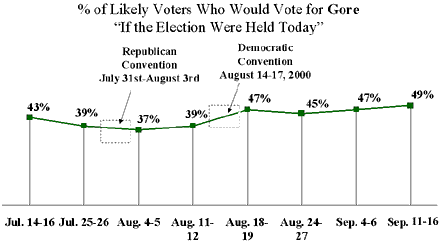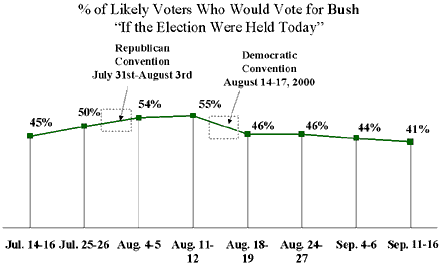GALLUP NEWS SERVICE
PRINCETON, NJ -- Given a choice, Americans continue to be slightly more likely to choose issues rather than leadership skills as the most important determinant of their choice for president this year, and Al Gore now is favored by Americans over George W. Bush on almost all issues tested in recent CNN/USA Today/Gallup polling. Gore's issue strength coincides with a continuing, albeit modest, lead for Gore over Bush among likely voters -- as the campaigns of both candidates prepare to enter a phase in which they will be required to share the media spotlight with the Sydney Olympics, which start today.
Issues More Important Than Leadership
In January, as the election year began, voters were more likely to
say that it was leadership skills and vision that mattered to them,
rather than the candidates' stances on the issues, by a 51% to 36%
margin. This pattern persisted through the spring. By the end of
July, however, as the conventions were about to get underway, the
issues dimension moved up. By August, issues had surpassed
leadership in terms of importance to voters. Now, in the most
recent three days of polling, issues were selected as most
important by 44% of likely voters, compared to 38% who chose the
"leadership skills and vision" side of the equation.
This shift in voters' priorities towards issues coincided with Al Gore's own decision to emphasize issues at the Democratic convention in Los Angeles in August. Now -- about a month later -- likely voters are more likely to select Al Gore as doing a good job on most issues tested than they are to select George W. Bush.
The chart below compares Gore's advantage or disadvantage on the set of issues tested in this week's polling, and compares them where appropriate to the same measures from the last survey conducted in July before the conventions of both parties began.
|
Gore's Advantage or Disadvantage Compared to Bush on Selected Issues |
|||
|
|
|
Net change: Before conventions to now |
|
|
Overall Ballot -- Among Registered Voters |
|
|
|
|
The economy |
-13 |
+12 |
+25 |
|
Taxes |
-19 |
+1 |
+20 |
|
Social Security |
-3 |
+12 |
+15 |
|
Medicare |
+5 |
+17 |
+12 |
|
Health care |
+3 |
+14 |
+11 |
|
Education |
-5 |
+9 |
+14 |
|
Handling budget surplus |
-15 |
+7 |
+22 |
|
Prescription drugs |
-- |
+19 |
-- |
|
Raising children in today's culture |
-- |
+11 |
-- |
|
Rising price of gasoline and fuel oil |
-- |
-5 |
-- |
Gore's overall gain over Bush on the trial heat ballot since the late July poll is 18 points (Gore went from a 50% to 39% deficit to his current 49% to 41% lead). Everything else being equal, we might expect that the voters' choice of Gore or Bush on these issues would change at the same rate that the ballot changes.
As can be seen, there were two issues whose change over this period exceeded the average, or expected, change:
- The economy -- Gore gained 25 points over Bush in terms of being chosen as best able to handle the economy, the largest gain on any of the measures included in both surveys
- Handing the budget surplus -- Gore gained 22 points
On the other hand, there were three issues on which Gore gained less than would be predicted by his movement on the ballot between late July and now:
- Health care -- Gore gained 11 points
- Medicare -- Gore gained 12 points
- Education -- Gore gained 14 points
The remaining two issues were more nearly in line with the expected gains:
- Taxes -- Gore gained 20 points
- Social Security -- Gore gained 15 points
In summary, Gore does best vis-à-vis Bush in terms of prescription drugs, Medicare and health care. Bush's relative strengths are in terms of the rising cost of gasoline and fuel oil and in terms of taxes.
Gore Maintains Small Lead
Over the last six days -- Monday, September 11 through Saturday,
September 16 -- Gore has averaged 49% of the vote, while Bush has
averaged 41%. By way of contrast, Bush led Gore by an average of
eight points, 48% to 40%, in Gallup polls conducted in June and
July.


Al Gore's most significant gains coincided with the Democratic convention in mid-August. Gore averaged 46% of the vote in two late August polls. Now, as noted, he is up to 49%, while Bush has dropped from an average of 48% in June and July to 41% now.
The Summer Olympics in Sydney, Australia begin officially on Friday, and the conventional wisdom has it that the presidential election will become a clear back-burner issue for many Americans during the Olympic period. Barring high-visibility gaffes or revelations, it is the period immediately after the Olympics -- which will now include three presidential debates -- that will most probably offer the next opportunity for a significant realignment of this year's presidential race.
Survey Methods
The results reported here are based on telephone interviews with a
randomly selected national sample of 1,008 adults, 18 years and
older, conducted September 11-13, 2000, and surveys of randomly
selected samples of likely voters from September 11-16, 2000. For
results based on these samples, one can say with 95 percent
confidence that the maximum error attributable to sampling and
other random effects is plus or minus 3 percentage points. In
addition to sampling error, question wording and practical
difficulties in conducting surveys can introduce error or bias into
the findings of public opinion polls.